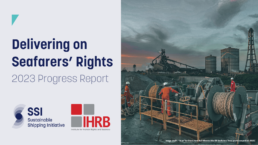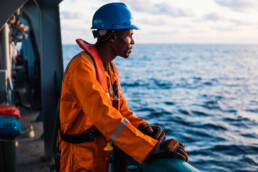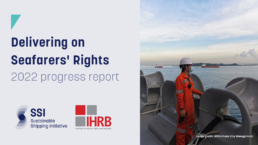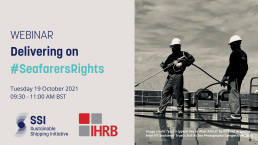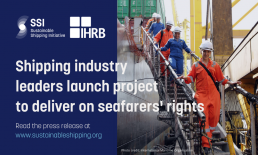Time period: 2020-Present
Members involved: Forum for the Future, Klaveness Combination Carriers, RightShip, South32, Wilhelmsen Ship Management
Partner: Institute for Human Rights and Business (Working Group Co-Chair)
Delivering on seafarers’ rights is a project undertaken by the Sustainable Shipping Initiative and co-convenor the Institute for Human Rights and Business (IHRB), bringing together shipowners, operators, charterers and cargo owners to address systemic challenges to seafarers’ rights and welfare and drive positive change in the industry.
- Watch the launch webinar and read the summary (October 2021)
- Code of Conduct – Delivering on seafarers’ rights (October 2021)
- Self-assessment questionnaire (Note: This is a PDF document that can be printed or filled out. If you wish to submit your self-assessment via the RightShip Crew Welfare Platform, click the link below) (October 2021)
- RightShip Crew Welfare Tool (October 2021)
- Read the first Delivering on seafarers’ rights progress report (October 2022)
The work leading to the Code of Conduct and self-assessment questionnaire consisted of an eight-month consultation and collaboration process with cargo owners, charterers, civil society, seafarers’ organisations, shipowners and operators, and others.
In collaboration with the Rafto Foundation for Human Rights, a Code of Conduct was developed with 52 clauses, including and going beyond the ILO Maritime Labour Convention (MLC) to focus on the full spectrum of seafarers’ rights and welfare, from fair terms of employment and minimum crewing levels to the management of grievance mechanisms.
In addition, a self-assessment questionnaire was developed in collaboration with RightShip to enable immediate action across the industry. The questionnaire provides practical guidance on adopting the Code of Conduct and is a useful tool for shipowners and operators/managers to understand their responsibilities while assessing current operations and ways of working, subsequently showing areas for improvement. RightShip have developed a Crew Welfare Tool on their website that enables any DOC holder to submit an online self-assessment.
Further detail can be found here: https://www.sustainableshipping.org/seafarers/
- To improve respect of the seafarers’ rights and welfare and provide a safe, healthy and secure work environment for seafarers, leading to more sustainable supply chains
- To identify mechanisms for seafarers to understand their human rights and welfare needs, report abuse of them and access remedy
- To improve transparency on actions taken to identify, mitigate and prevent human rights risks within the shipping value chain
- To improve the ability of charterers to conduct human rights and welfare due diligence and make informed decisions
- To catalyse collective action and leadership by charterers to advocate for more robust respect of seafarers’ rights and welfare within the industry
News & Resources
Delivering on seafarers’ rights – 2023 progress report
January 31, 2024
‘SEAFAIRER’ Roundtable in Singapore, 2023
December 10, 2023
Seafarers and recruitment fees: Research briefing
April 18, 2023
SEAFAIRER Roundtable in Singapore
November 16, 2022
Delivering on seafarers’ rights – 2022 progress report
October 27, 2022
Seafarers’ rights and welfare are a shared responsibility
October 28, 2021
Self-assessment questionnaire – Delivering on seafarers’ rights
October 12, 2021
Code of Conduct – Delivering on seafarers’ rights
October 12, 2021
IHRB Voices: Delivering on Seafarers’ Rights
June 24, 2021


